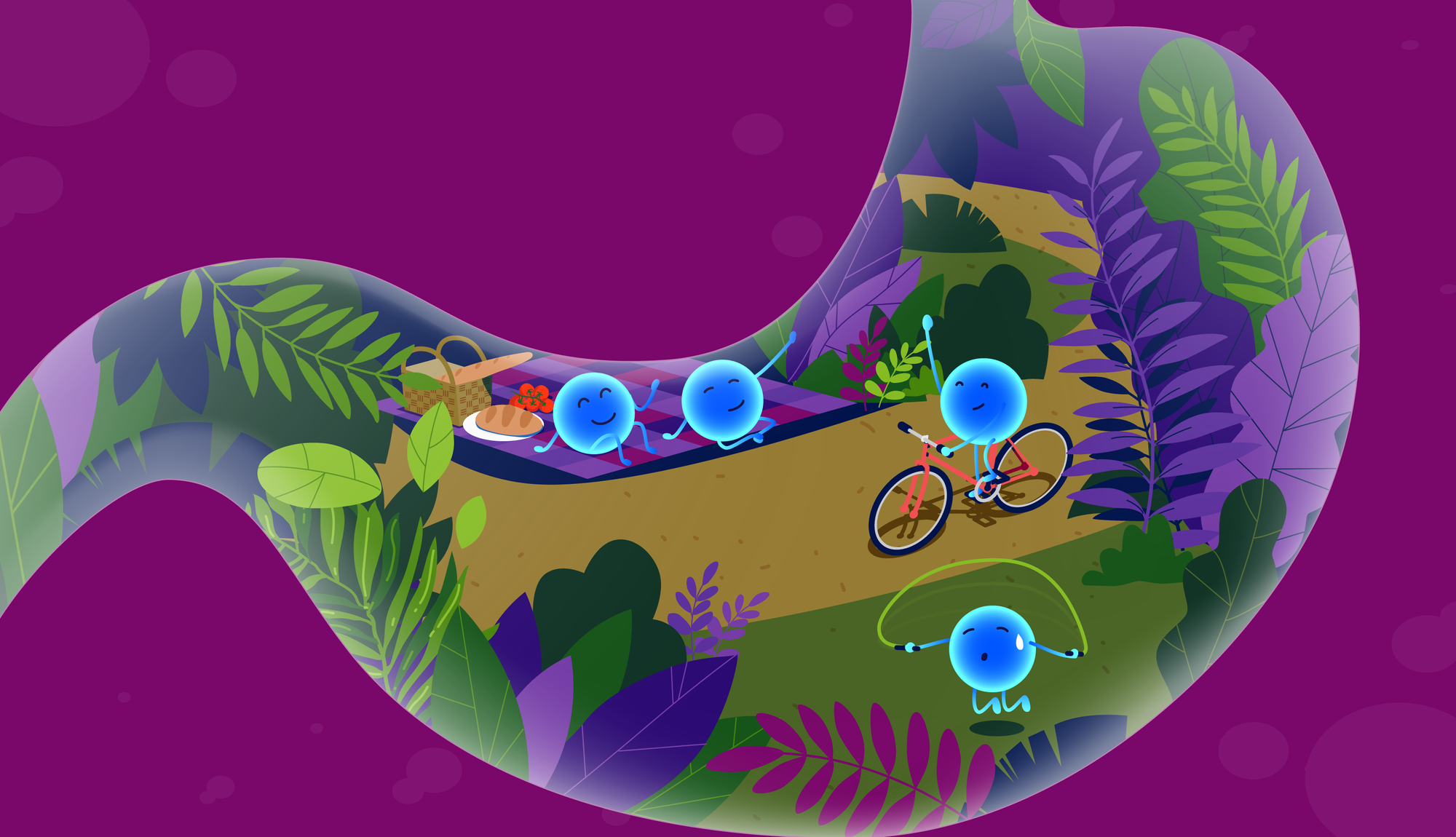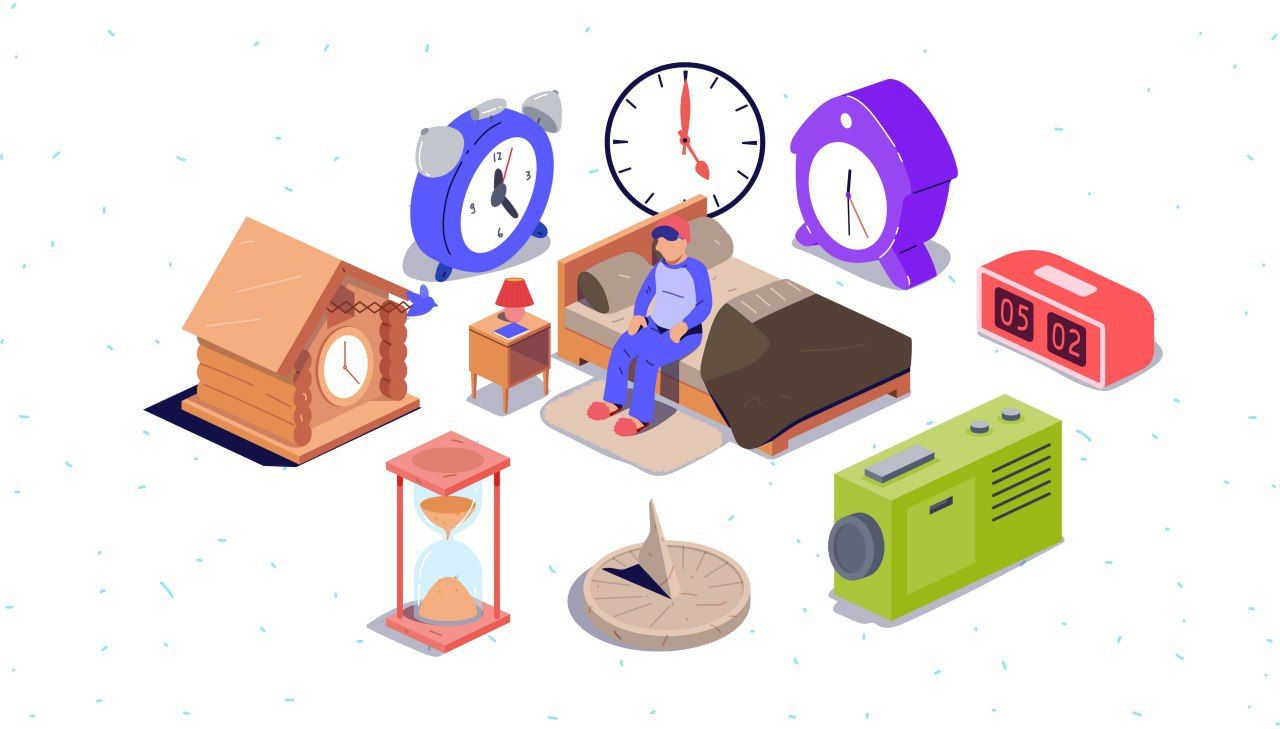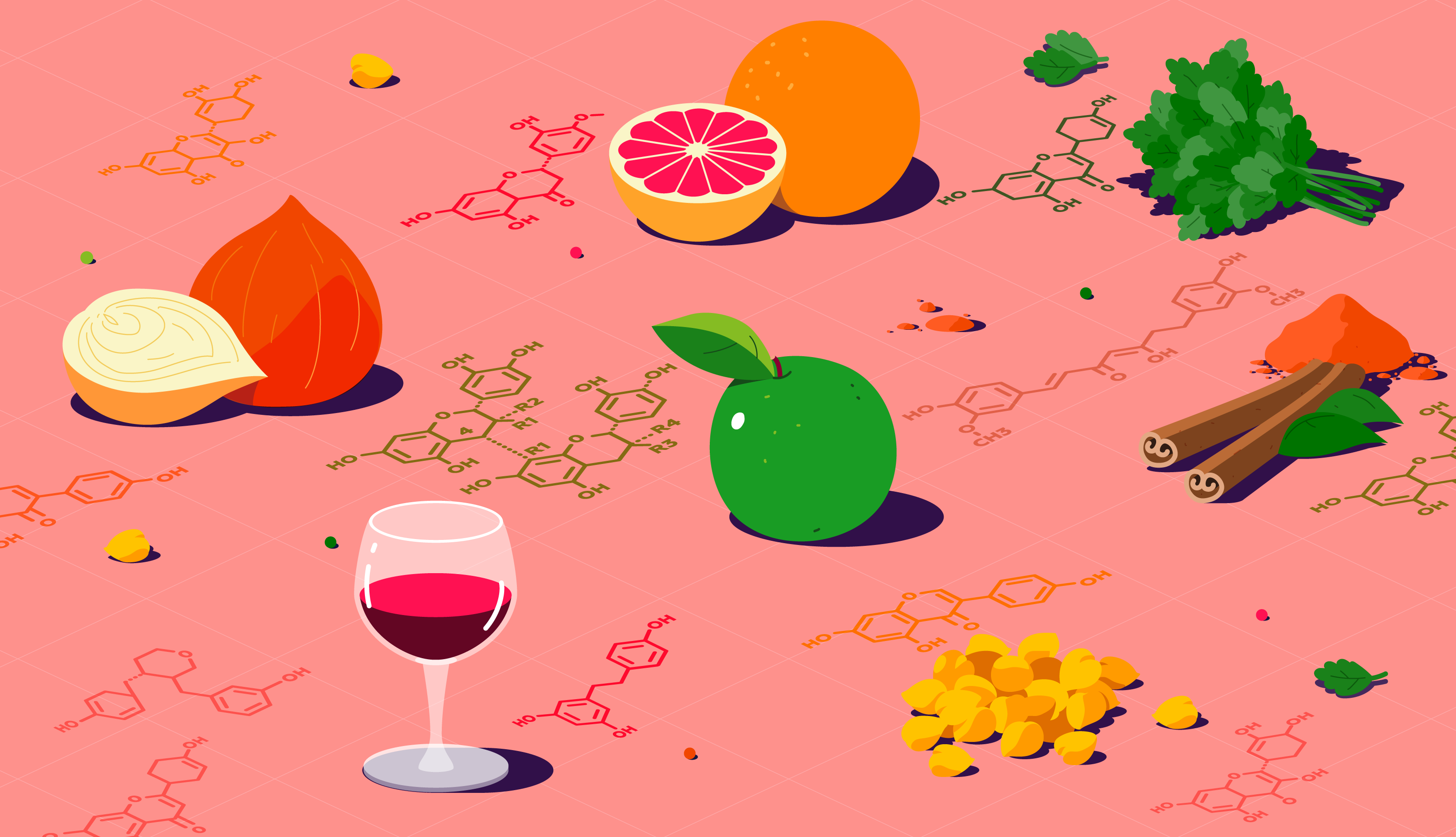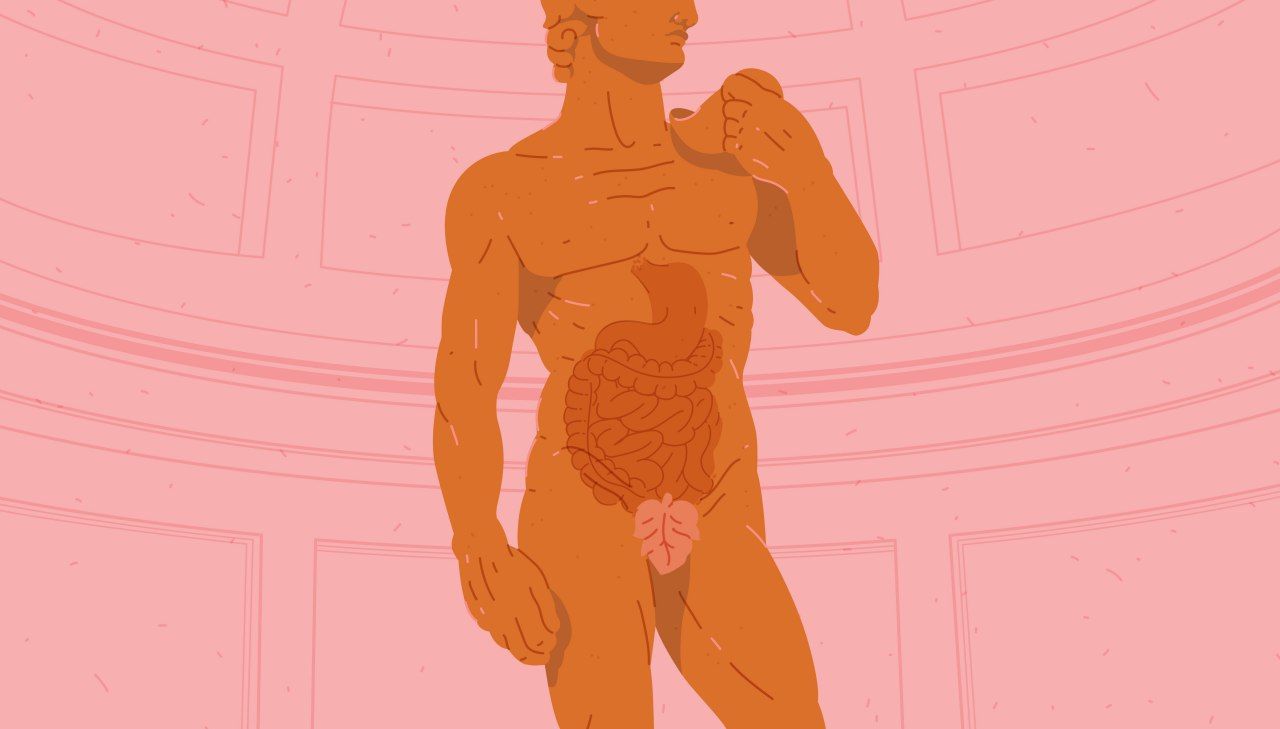Thrive in 2022 with good gut health practices that focus on things you can change, like your lifestyle, food habits, sleep patterns, and stress levels.
Your gut is home to trillions of bacterial cells, many of which carry out vital roles to keep your body functioning and your health in tip-top condition. These bacteria, alongside fungi and viruses, make up your gut microbiome.
Table of contents
- 1. How to restore healthy gut flora
- 2. How to increase good bacteria in the gut
- 3. The role of exercise in gut health
- 4. Stress affects the gut via the brain
- 5. Sugar can cause gut imbalances
- 6. Stay away from artificial sweeteners
- 7. Improve gut health with sleep
- 8. Give your gut a rest to heal
- 9. Alcohol disturbs gut functions
- 10. Snacking and leaky gut are linked
- 11. Some painkillers can affect the gut
- 12. Laxatives should be used with care
- 13. Don't eat that dodgy kebab
- 14. Fad diets aren't quick-fix solutions
- 15. Antibiotics are tough on the microbiome
- 16. Influencers don't always know science
A healthy microbiome is a balanced microbiome. Too many bad or opportunistic microbes and you’re at an increased risk of inflammation and disease. Healthy gut bacteria, on the other hand, protect you from disease, keep inflammation low, and even promote your mental health.
Our simple tips will help you build a better gut. Luckily, they’re not too difficult to follow either, so you can easily incorporate them into your everyday life. By doing so, you should feel better and your gut flora should be restored.
☝️TIP☝️Check your gut health status with the Atlas Microbiome Test. 10% off when you sign up for blog updates!
How to restore healthy gut flora
Probiotics can support a healthy microbiome. These foods and supplements contain live bacteria that can benefit our health.
The bacteria in your gut make up a very important ecosystem, and if this becomes upset, it can lead to abnormalities in its composition and diversity. There are many things in life which can have negative consequences on your gut bacteria and intestinal health.
Studies have shown that probiotics can help to restore gut bacteria to healthy levels which protects us from inflammation. Live fermented foods are great sources of natural probiotics that you can eat and drink. Researchers think these traditional foods may play an important role in human health.
| Probiotic foods | Probiotic food ingredients |
|---|---|
| Cheese, yoghurt | Dairy products including milk and cream |
| Sourdough bread | Flour and water |
| Lacto-fermented pickles | Saltwater brine (not vinegar) and vegetables like cucumbers |
| Sauerkraut | Cabbage and salt |
How to increase good bacteria in the gut naturally
A good gut diet requires lots of dietary fibres, called prebiotics. You know, the ones found in natural, plant-based foods? Your gut bacteria love them!
The probiotics we mentioned above thrive on prebiotics – many of which are the non-digestible carbohydrates in fruit, veg, seeds, grains, and pulses. However, the Western diet is low in foods that promote healthy gut flora, but high in fat, meat, and refined sugar.
Ultimately, this affects our health by reducing healthy gut bacteria and increasing our risk of weight gain, metabolic problems, chronic inflammation, and disease. Fortunately, it’s an easy problem to solve because your gut bacteria love edible plants.
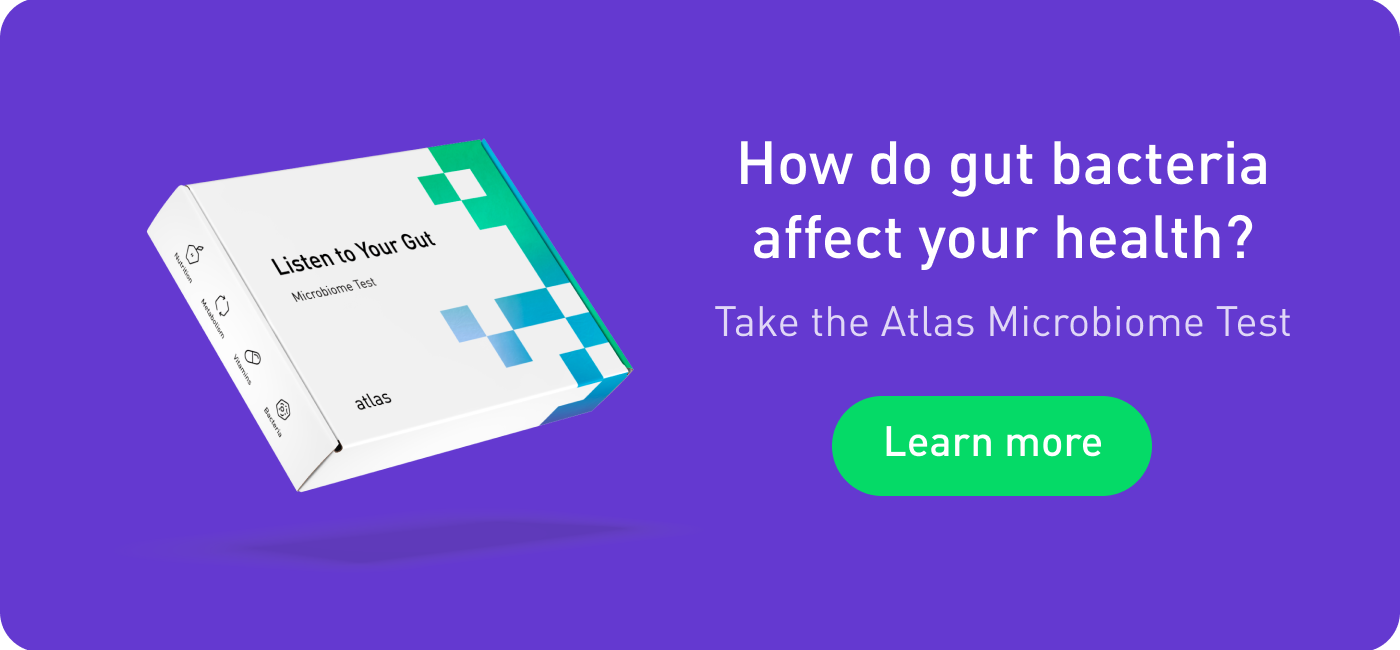
Gut health foods for your microbiome
- barley
- rye
- wholegrains
- apples
- onions
- carrots
- mushrooms
- garlic
- legumes
- wheat
- Jerusalem artichokes
When your microbes munch on these prebiotics, they boost your health and wellbeing by maintaining the gut lining, and preventing inflammation. Basically, a high-fibre diet is key to a healthy microbiome.
Exercise in your gut health diet
Who knew that getting the heart pumping and the sweat pouring was good for the diversity of your microbiome? Well it is, and here’s why.
Research has shown that individuals who lead a sedentary lifestyle have a less diverse microbiome. Therefore, it’s not just what you put into your body that counts, there are so many other lifestyle aspects involved in improving gut health.
But don’t despair, there are simple things you can do about it. Athletes, for example, have a more diverse gut than nonathletes. But you don’t need to be an Olympian to make a difference. Walking, jogging, and dancing all count, just aim for 150 minutes each week alongside some strength exercises. Trust us, your gut bacteria will love you for it.
If you’re stressed, so is your gut
Stress negatively impacts many aspects of our health including physical, mental, and even gut health.
Your microbiome doesn’t just affect your intestines, it influences other organs, including your brain. If you’re feeling stressed out, your microbes can feel it too. It can even decrease the abundance of important probiotic bacteria like Lactobacillus.
Keeping beneficial bacteria at healthy levels can even improve your resilience to adversity. That’s because your gut microbes influence stress levels and mood hormones. Alleviate your stress by avoiding unnecessarily demanding situations, and try some techniques like breathing exercises and meditation.
How to improve gut health naturally with less sugar
Sugar is everywhere, even when you can’t taste it. Sadly, refined sugar can upset the balance in your gut and your metabolism.
If you’re wondering how to get rid of bad bacteria in the gut, less sugar can help. Soft drinks, processed foods, takeaways, and restaurant food can contain high levels of sugar because it helps balance flavour and cover up poor quality ingredients. But don’t get these sugars confused with complex carbs (in edible plants) that your gut bacteria need to thrive and survive.
Artificial sweeteners are not on the healthy gut diet plan
Sugar-free alternatives have been branded as a better option than sugar, but when it comes to your intestinal health, this isn’t strictly true.
Artificial sweeteners may be a convenient replacement for those with a sweet tooth, but they may not be as beneficial as originally thought. Some studies have shown that they can actually increase blood sugar and increase the risk of obesity and type 2 diabetes.
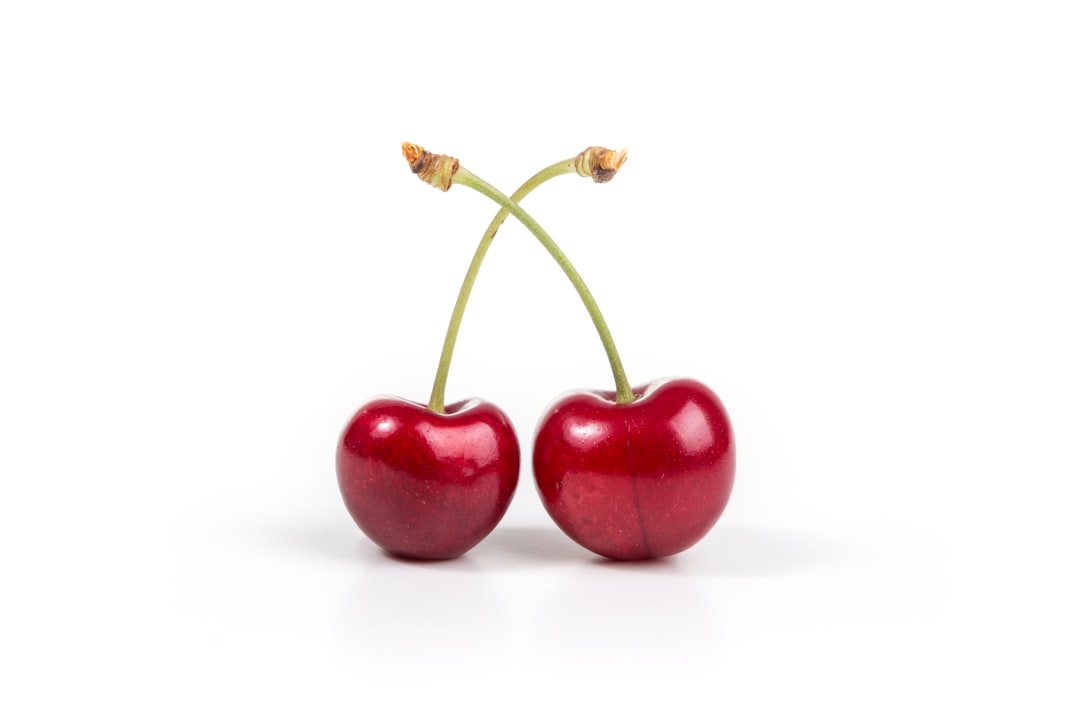
It’s easy to reach for a non-sugar sweetener, but if you’re trying to lower your sugar intake, it’s worth considering reaching for a piece of fruit, some dark chocolate, or simply forgoing the syrup in your latte.
How to improve the gut microbiome with sleep
Your gut and brain use nerves and chemicals to communicate with each other, and their discussions can influence your sleep patterns and mood.
A lack of sleep often partners well with a poor diet, increased alcohol consumption, and weight gain. Research has shown that individuals who get a good forty winks have a more diverse microbiome. It also shows that sleep deprivation is bad for your brain. And when your brain isn’t happy, your whole body can feel it.
Tips for getting a better night’s sleep
- Get to bed around the same time every night
- Avoid screens or use night mode for an hour before bed
- Set a routine to wake and sleep at regular times
- Keep your room cold and use blackout curtains
Give your gut a rest from a hard day’s work
Giving your body a break from digesting food could protect from metabolic diseases and restore gut health.
In fact, some beneficial bacteria, like Akkermansia muciniphila, actually enjoy a nice fast, and help strengthen the gut lining when they aren’t being fed by your food intake. There’s no need to be radical here, though, just lay off the midnight snacks and when you do eat, make sure you cram in wholesome plant-based carbs!
Alcohol and gut health
Getting merry too often can have implications for your intestinal health, not just your head and your wallet.
Simply put, reducing your alcohol consumption is generally just good for your health, but the odd glass of red wine isn’t so bad. It contains polyphenols, antioxidants that help protect you from inflammation and disease, and increase the abundance of beneficial bacteria. If you get red and blotchy when you drink, you might have alcohol intolerance.
☝TIP☝ Find out if you're predisposed to alcohol intolerance, gluten intolerance and lactose intolerance with the Atlas DNA Test.
Snacking is nice, but is it necessary?
We all love a good munch on something delicious, but snacking for the sake of it may not be promoting a healthy gut.
Eating triggers a healthy immune response known as postprandial inflammation. This is normal, but if you eat all the time, you’re actually prolonging this inflammatory state, increasing your calorie intake, and promoting weight gain. Luckily, there are a few simple hacks to solve the snacking.
Easy on the painkillers for your gut flora
Non-steroidal, anti-inflammatory are painkillers that can alter the gut microbiome and lead to an upset stomach.
Better known as NSAIDs, these medications are among the most commonly prescribed. They are used to treat pain by targeting inflammation, and are especially popular because they help relieve menstrual pain.
However, even though they can produce short-term relief, chronic use can damage your gut lining and make your gut microbes sad. They irritate your intestinal lining, causing inflammation and even bleeding too – both of which are detrimental to this organ and your microbiome.
☝️TIP☝️Some of these painkillers, like ibuprofen, can be bought at your shop, others prescribed by your doctor.
Laxatives
Feeling clogged up? Wait before you reach for a laxative. It might relieve the pressure, but it can also disturb your gut’s natural rhythm.
Chronic constipation is bothersome, and poor dietary habits can mean you’re not as regular as you should be. However, long-term use of laxatives can leave you dependent on them and may also deplete your gut flora. Perhaps unsurprisingly, laxative abuse is also a common trait in eating disorders.
If you’re experiencing constipation frequently and it’s not caused by an underlying medical condition, making changes to your lifestyle will help. Add more fibre to your diet, start exercising regularly, and try to maintain a daily toilet routine to stay regular. And just remember, sometimes it’s okay if you go a day without a poop.
No dodgy kebabs on the microbiome diet menu
Greasy, processed food goes hand-in-hand with a boozy night out. Put them together and you have a recipe for digestive mayhem.
We’ve all been there and eaten something which just didn’t agree with our gut. Bacteria is a common cause of food poisoning with symptoms like vomiting, diarrhoea, and incapacitating stomach cramps. In severe cases, it can be deadly. That’s why proper food handling and hygiene in restaurants is critical.

So it’s worth considering the possibility that your dodgy Saturday night takeaway may be a culprit in temporary digestive discomfort. When pathogens invade, they rapidly multiply and produce toxins. In turn, the gut lining reacts with inflammation. So if you are heading out to paint the town red, line your stomach before you go out and don’t eat that dodgy takeaway.
Fad diets should be avoided
Science has shown repeatedly that dieters are doomed to failure, yet new fad diets always manage to find abundant followers.
Fad diets are often restrictive novelties that are not backed up by medical research. In many cases, they promise quick and easy weight-loss strategies without any information about the science, risks, and potential long-term consequences for your health, gut, and microbiome.
These nutritional regimes can mean cutting out whole food groups or eating a specific type of food. A major one is the no-carb craze, but we know that a healthy microbiome and happy gut flora need prebiotic fibres to produce beneficial metabolites. Just removing food can disturb this sensitive ecosystem and your body’s delicate metabolic balance.
Restoring gut flora after antibiotics
Antibiotics deplete many bacteria, not just the ones making you sick. That’s why they should only be used under the supervision of a doctor when you really need them.
Antibiotics are an essential means to target bacterial infections. The problem is, we’ve used them too much and antibiotic resistance is becoming a major problem. Your gut flora isn’t keen on them either, and for good reason.
Studies show that antibiotics alter the composition of your gut biome in the long and short term. That’s why some doctors also prescribe a probiotic at the same time. If you do need them, make sure to top up your prebiotic fibre intake to nourish your good bugs, and get a microbiome test to see how you can help them recover.
Influencers don’t necessarily know science
Social media made people famous by promoting an aspirational lifestyle who often receive payment for advertising products and services.
Ask yourself, how many accredited health experts and researchers do you follow? Social media influencers are often highly paid by companies to promote products and/or services. They also made it to the top by sharing opinions, but not necessarily scientific facts.
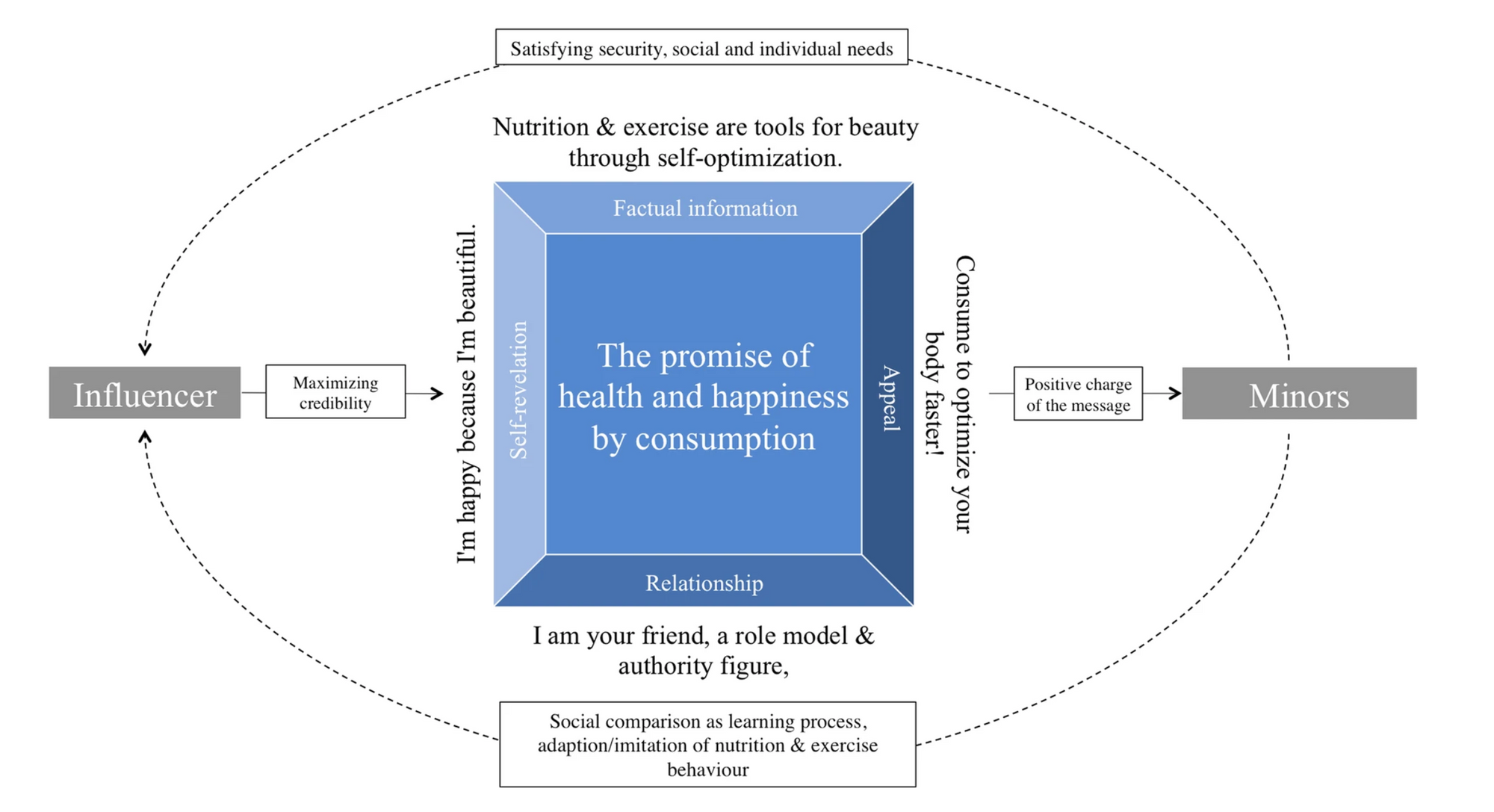
It’s important to do your own research, or else you may find yourself doing some very unscientific stuff and buying all sorts of gut health supplements that some rando with a hundred thousand followers told you to. Don’t be afraid to question what you’re being told.
In short, here’s how to have a healthy gut
Never to underestimate the importance of gut health when it comes to your body and wellbeing. It’s home to trillions of bacteria, not to mention actual human cells, that work hard to keep you fit and well. Your lifestyle can have a serious impact on this balance.
Making simple positive changes like more fiber in your diet, more exercise, and less unnecessary medication is how to get a healthy gut and wholesome gut microbiome. Just remember, you really do have the power to change, one step at a time.
- Clarke, S, F et al., Exercise and Associated Dietary Extremes Impact on Gut Microbial Diversity, 2017
- Cully, M., Antibiotics Alter the Gut Microbiome and Host Health, 2019.
- Li, Y et al., The Role of Microbiome in Insomnia, Circadian Disturbance and Depression, 2018
- Martinez, K, B et al., Western Diets, Gut Dysbiosis, and Metabolic Diseases: Are They Linked? 2017
- McFarland, L, V., Use of Probiotics to Correct Dysbiosis of Normal Microbiota Following Disease or Disruptive Events: A Systematic Review, 2014.
- National Health Service, Leaky Gut Syndrome, 2018
- Ohkusa, T et al., Gut Microbiota and Chronic Constipation: A Review and Update.2019.
- Rogers, M, A, M and Aronoff, D, M, The Influence of Nonsteroidal Anti-Inflammatory Drugs on the Gut Microbiome, 2015.
- Thomas, K, Key Opinion Leaders Supercharged by the Internet: Paid Doctor and Patient Influencer on Social Media. 2019.
- Zinӧcker, M, K and Lindseth, I, A, The Western Diet-Microbiome-Host Interaction and Its Role in Metabolic Disease, 2018
- K Pilgrim & S Bohnet-Joshko, Selling health and happiness how influencers communicate on Instagram about dieting and exercise: mixed methods research, 2019

